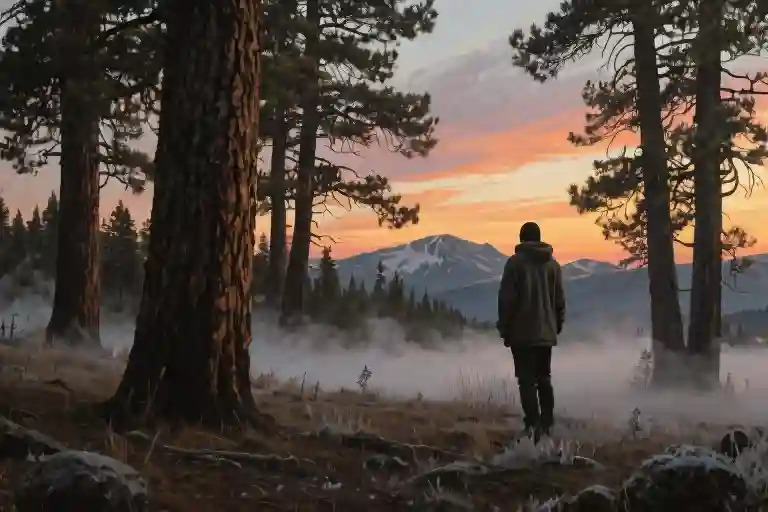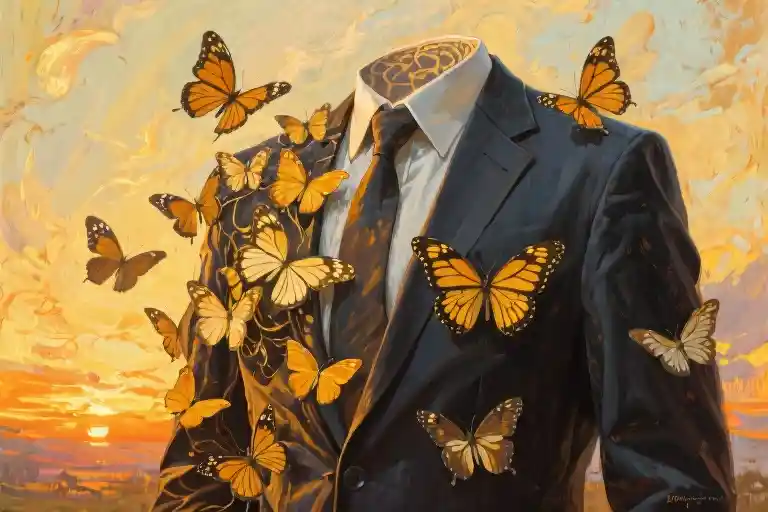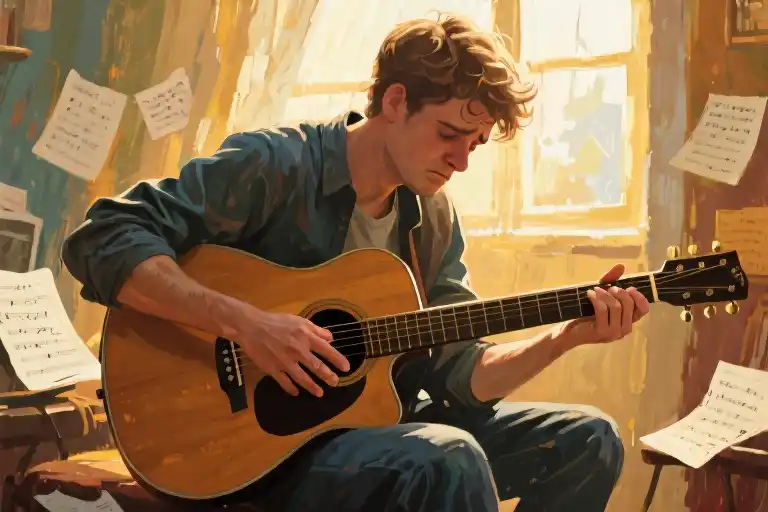The black sea of Ponderosa pines stretches endlessly before me, their silhouettes swallowing what little moonlight filters through the clouds. Somewhere in that darkness, things move – branches cracking under unseen weight, the occasional rustle that could be wind or something far more alive. My fingers dig into the cold earth as I count the layers I’m wearing, wondering if they’ll be enough when the temperature drops further tonight. This is October in the Montana Rockies, where the air smells like pine resin and impending snow.
I’ve never felt more naked in my life. No tent. No fire. No goddamn bear spray because some part of me thought that would ‘cheapen the experience.’ My water bottle sits half-empty beside me, rationed carefully across the next seventy-two hours. They call this a Vision Quest, which sounds profoundly spiritual until you’re actually doing it. Then it just feels profoundly stupid.
Three days. Alone. No food. No distractions. Just me and whatever decides to wander through this quarter-mile radius of wilderness I’ve staked out. The brochure made it sound transformative; right now, it mostly feels like the worst camping trip imaginable. Every textbook survival instinct screams that this is how people become cautionary tales, yet here I am – a modern idiot seeking ancient wisdom through voluntary discomfort.
What they don’t tell you about Vision Quests is how much time you spend not having visions. The romantic notion of enlightenment crumbles fast when you’re cold, hungry, and ninety percent certain something just growled in the bushes. I came expecting epiphanies; so far I’ve gotten a stiff back and the growing realization that my smartphone addiction might be more severe than I thought.
Somewhere around midnight, the wind picks up. The pines start whispering in a language I can’t understand, and it occurs to me that this is exactly what I signed up for – to be hollowed out by the wilderness until something, anything, might fill the space. Whether that something turns out to be wisdom or just hypothermia remains to be seen.
Why I Walked Into the Wilderness
The email notification chimed for the third time that hour. I stared at the glowing screen in my dark bedroom, the blue light making my retinas ache. Another client request, another spreadsheet to update – the cycle had continued uninterrupted for seventeen months. That’s when I first noticed the Post-it note stuck to my monitor, its yellow surface now faded from sunlight exposure. In my own handwriting, it read: “When was the last time you felt alive?”
I couldn’t answer that question. Not honestly, anyway. The corporate wellness retreats didn’t count, with their forced trust falls and overpriced smoothies. Neither did the weekend hikes where I’d compulsively check my phone at every summit. Something fundamental had gone missing, though I couldn’t name what exactly. The realization crept up like cold water – I’d become a spectator in my own life.
That’s probably why the library book caught my eye. Wedged between business bestsellers and diet guides, its cracked spine read “Ancient Rites of Passage: Vision Quests and Modern Transformation.” The pages fell open to a black-and-white photograph of a lone figure silhouetted against Painted Rocks. No gear, no smartphone, just a person sitting cross-legged in empty space. The caption explained this was a traditional coming-of-age ritual among some Indigenous cultures – days of fasting and solitude in nature to seek guidance. My rational mind dismissed it as anthropological curiosity. But something deeper, something primal, kept returning to that image.
Modern life had become an endless series of curated experiences – Instagrammable moments stripped of real risk or revelation. We’d perfected the art of simulated living: VR headsets for adventure, meditation apps for enlightenment, dating algorithms for connection. Yet the essential human experiences – fear, hunger, genuine uncertainty – had been systematically eliminated from our daily existence. The book’s description of vision quests lingered in my mind precisely because it promised none of the comforts I’d grown accustomed to. No guarantees, no five-step plans, just raw confrontation with whatever emerged when all the noise stopped.
Three weeks later, I found myself lying to coworkers about a “family emergency” that required complete disconnection. The truth felt too absurd to explain: I needed to starve myself in grizzly country to remember what being human felt like. Even as I packed the rental car with minimal supplies – a sleeping bag, water bottles, a journal – part of me kept waiting for the sensible version of myself to intervene. She never did.
The final push came from an unexpected source. My barista, overhearing my nervous chatter about the trip, shared that his grandfather had been a Sun Dance practitioner. “Just remember,” he said while steaming milk, “it’s not about getting answers. It’s about learning what questions to ask.” He handed me a latte with a foam heart – the last comforting thing I’d consume for days.
As the highway signs for Missoula faded in my rearview mirror, I realized this wasn’t really about ancient rituals or spiritual awakening. It was simpler and more terrifying than that. After years of outsourcing my decisions to career ladders, social expectations, and algorithmic recommendations, I needed to remember what my own voice sounded like. Even if that voice turned out to be screaming into the void.
The First Night: Shapes of Fear
The black sea of Ponderosa pines swallowed what little moonlight filtered through the clouds. Each gust of wind made the trees sway like a predator testing its prey. My rational mind knew these were just sounds of nature – the creak of branches, the rustle of underbrush. But after seven hours of absolute solitude, my prefrontal cortex had surrendered to the older, more primitive parts of my brain.
Every snapped twig became a grizzly’s approach. Every rustle in the bushes transformed into a mountain lion’s crouch. The wilderness plays cruel tricks on urban minds; we’ve forgotten how to distinguish between real danger and the symphony of ordinary forest noises. My fingers kept twitching toward where the bear spray should have been, finding only empty belt loops. That particular oversight now seemed less like minimalism and more like Darwin Award material.
Cold seeped through my layers as the temperature dropped. I’d chosen this late October window deliberately – cold enough to keep me alert, but not quite freezing. Yet now I questioned every decision that brought me here. The romantic notion of ‘returning to nature’ crumbled under the visceral reality of being a hairless ape in predator territory.
By midnight, my senses had become absurdly acute. I could hear my own eyelashes brushing against the fleece hat when I blinked. The blood pulsing in my temples sounded like drumbeats. This wasn’t the mindful awareness I’d hoped for – it was raw, jittery hypervigilance. Somewhere between counting my tenth imaginary bear attack and realizing I’d been holding my breath for thirty seconds, a terrible thought emerged: What if nothing happens? What if I just sit here being scared for three days?
Then the wind shifted. The pines started whispering in a language just beyond comprehension. For one fleeting moment, the fear lifted, replaced by something stranger – the eerie comfort of being completely insignificant. The forest didn’t care about my vision quest. The bears, if they existed, wouldn’t spare me because of my noble intentions. This indifference felt oddly like grace.
I unclenched my jaw for the first time in hours. The safety risks remained real (note to self: always bring the damn bear spray), but the psychological monsters lost some power when I stopped pretending this was anything other than what it was – one scared human in a very big woods. Maybe that acknowledgment was the first real vision of the quest.
The Body’s Betrayal
The second day dawned with a clarity that felt almost mocking. My breath hung in the air like little ghosts as I uncurled from my makeshift nest of pine needles. The cold had seeped into my bones during the night, settling into my joints with the persistence of an unwelcome guest. My fingers, stiff and uncooperative, refused to perform their usual morning rituals. I watched them tremble—not from fear this time, but from something more primal, more humiliating: my body’s simple, undeniable need for warmth.
Meditation became impossible. The noble intention of sitting still, of emptying my mind, collapsed under the relentless chattering of my teeth. Each attempt to focus on my breath was interrupted by involuntary shivers running down my spine like tiny earthquakes. The irony wasn’t lost on me—here I was, seeking spiritual enlightenment, while my physical form reduced me to a bundle of survival instincts. The wilderness doesn’t care about your quest for meaning; it only cares if you can endure.
By mid-morning, the hunger announced itself with growing insistence. The first twelve hours had been manageable, even familiar—that light-headed buzz you get when skipping breakfast. But now, as the sun climbed higher, my stomach began speaking in languages I didn’t recognize. It gurgled, it groaned, it staged what felt like small rebellions beneath my ribs. Time stretched and warped; minutes felt like hours, and I found myself counting not in hours but in stomach contractions.
Around what I guessed was midday (without a watch, time became something felt rather than measured), the trees began playing tricks on me. The tall Ponderosas, so steadfast and familiar yesterday, now seemed to shift when I blinked. Their shadows stretched across the forest floor like ink spreading on wet paper. Once, I swore I saw a figure standing between two trunks—a tall shape that resolved itself back into ordinary timber when I rubbed my eyes. The line between reality and imagination blurred, not with the profound mystical quality I’d hoped for, but with the mundane desperation of a body running low on fuel.
As evening approached, the cold returned with reinforcements. My earlier shivers graduated to full-body tremors that made my vision wobble. The tree that had seemed humanoid earlier now appeared to be nodding at me, its branches swaying in a rhythm that almost looked like speech. I laughed aloud at the absurdity—my grand vision quest reduced to negotiating with a pine tree about dinner options. The sound of my own laughter startled me; it was hoarse, unfamiliar, the voice of someone being slowly unmade by the elements.
That night, as I lay watching the stars through the lattice of pine branches, I realized something fundamental: enlightenment makes for a terrible survival strategy. All the profound thoughts I’d hoped to have were being crowded out by more immediate concerns—the cold spot beneath my hip, the way my tongue stuck to the roof of my mouth, the animal part of my brain that kept insisting this was all a terrible idea. The wilderness wasn’t a blank canvas for my spiritual aspirations; it was a mirror, showing me exactly how fragile my civilized self really was.
Somewhere in the dark, an owl called. I counted its hoots like a mantra, clinging to that external rhythm as my own internal ones faltered. The second day hadn’t brought me closer to any great truth—only closer to understanding how much truth I’d been avoiding by keeping myself fed, warm, and comfortably distracted. As sleep finally claimed me, I wondered if that wasn’t the vision after all.
The Absurd “Revelation”
By the third day, my mind had become a funhouse mirror of exhaustion. The Ponderosa pines swayed in patterns that almost looked like language, and the sunlight filtering through the branches arranged itself into geometric shapes that seemed profoundly significant at the time. I remember staring at a particular patch of light on the forest floor, convinced it was forming the outline of a wolf’s head – my spirit animal, I presumed, come to deliver wisdom.
It took me three years of distance to admit the obvious: I was simply dehydrated, sleep-deprived, and possibly flirting with mild hypothermia. The human brain is remarkably good at finding patterns where none exist, especially when pushed to its physiological limits. What felt like divine communication was just my overcooked neurons firing random associations.
Coming down the mountain carried its own peculiar melancholy. Part of me clung to the disappointment of not receiving some grand cosmic download – no burning bush moment, no ancestral voices whispering through the wind. Yet there was an unexpected lightness too, the kind that comes when you realize the universe doesn’t owe you epiphanies on demand. The wilderness had given me exactly what I needed: not answers, but better questions.
What fascinates me now isn’t whether the vision was “real,” but why my brain chose that particular moment to stage its elaborate puppet show. Under extreme conditions, our minds will fabricate meaning rather than face the terrifying alternative: that sometimes there is no meaning to be found. We’d rather hallucinate significance than sit with the void.
This understanding has served me better than any mystical experience could have. When facing uncertainty in my daily life, I can recognize when I’m grasping at phantom patterns instead of tolerating ambiguity. The real revelation was learning to distinguish between actual insight and my brain’s desperate attempts to make chaos feel orderly.
Modern spiritual culture sells us on the idea of breakthrough moments – lightning-strike transformations captured in Instagram-ready #VisionQuest posts. But the deeper work happens in the unglamorous aftermath, when you’re left sorting through the psychological debris of your own expectations. That’s where the actual growth occurs: not in the vision itself, but in waking up from it.
Five Years Later: The Vision That Never Was
The Ponderosa pines still smell the same – that sharp vanilla-but-not-really scent clinging to the bark. I run my fingers along the same tree I leaned against during those endless nights, half-convinced its rough texture would be my last earthly sensation. Funny how memory works. What felt like eternity then now compresses into a handful of visceral snapshots: the way moonlight turned my breath into ghostly plumes, the symphony of cracking twigs that kept rewriting itself in my ears, the exact shade of blue the horizon turned just before dawn.
Back in Missoula, people kept asking if I’d ‘found what I was looking for.’ For years, I gave unsatisfactory answers – fragments about clarity or perspective. The truth was messier. That solo wilderness survival experiment didn’t deliver a neatly packaged revelation. No spirit animals, no prophetic dreams, just three days of shivering and second-guessing my life choices. Instagram #VisionQuest posts never show the 3AM panic when you realize you voluntarily became bear bait.
Yet here’s the paradox: failing to have a transformative experience became its own transformation. Learning to sit with discomfort without demanding resolution rewired my approach to everything from career pivots to relationships. When my startup collapsed last year, that familiar wilderness dread resurfaced – the same churning stomach, same irrational certainty that disaster lurked just beyond visibility. But this time, I recognized the feeling. Instead of frantically seeking solutions, I waited. The answers that eventually emerged weren’t what I expected, but they were precisely what I needed.
Modern spirituality markets epiphanies like fast food – quick, satisfying, and nutritionally void. What my mountain exile really taught was the discipline of uncertainty. In boardrooms now, when colleagues demand five-year projections, I think about how that third night’s aurora borealis appeared exactly when I’d stopped straining to see signs. The wilderness doesn’t give answers; it dissolves the questions that never mattered to begin with.
Maybe that’s the real vision quest hack: stop questing. The pines knew this all along. They’ve been practicing radical acceptance for centuries – weathering storms without pretending to control the wind. It only took me five years of city living to understand their language.
Practical footnote for the stubbornly romantic: If you still insist on chasing enlightenment through discomfort (and I get it, I really do), at least pack a GPS beacon. Your future self – the one who’ll need years to unpack the experience – will thank you for surviving to tell the tale.
If You Still Want to Try
There’s something undeniably magnetic about stripping life down to its bare essentials. Maybe you’ve read this far and felt that quiet pull – the whisper that says what if I tried this too? Before you start packing your backpack with romantic notions, let’s talk brass tacks about wilderness survival and safer alternatives for self-discovery.
The Non-Negotiable Five
- Emergency communication device (satellite messenger or PLB) – This isn’t optional. That moment when I heard twigs snap near my campsite? Would’ve traded my left arm for an InReach. Modern devices like Garmin’s inReach Mini 2 allow two-way texting anywhere on the planet.
- Bear spray – My foolish decision to leave mine behind haunted me every rustling-leaf moment. Counter Assault’s 10.2 oz canister provides about 8 seconds of spray – enough to stop a charging grizzly at 30 feet.
- Insulation beyond what you think you’ll need – Nights in the Rockies drop below freezing even in October. A quality sleeping bag rated 10°F lower than expected temps plus a closed-cell foam pad saved me from hypothermia.
- Water purification – Giardia isn’t spiritual enlightenment. The Sawyer Squeeze filter weighs just 3 ounces and handles 100,000 gallons.
- Headlamp with extra batteries – When night falls in the wilderness, it falls hard. Black Diamond’s Storm 400 provides flood and spot lighting – crucial for maintaining circadian rhythms during solo retreats.
The Urban Vision Quest Alternative
Not ready to face grizzlies? Try this modified 24-hour “sensory confinement” experiment in your city:
- Digital blackout: No screens, no music, no podcasts. Just you and raw perception.
- Designated wandering zone: Pick a 3-mile radius you’ll explore on foot all day without destinations.
- Journal only at dusk: Let experiences accumulate without immediate interpretation.
- Night observation: Sit by a window observing the neighborhood’s nocturnal rhythms.
This stripped-down version often reveals similar insights about attention, fear, and mental chatter – minus the risk of becoming bear food.
A Necessary Disclaimer
Vision Quests originate from Indigenous traditions – treating them as another self-help trend risks cultural appropriation. If you’re serious about this path:
- Seek trained guides – Organizations like the School of Lost Borders offer ethically structured programs with wilderness medical support.
- Start small – Try a supervised overnight before attempting multi-day solos.
- Respect the land – Many sacred sites are ecologically fragile. Follow Leave No Trace principles religiously.
The wilderness doesn’t care about your spiritual aspirations. It will test your preparedness without mercy. But that’s perhaps the first real lesson – before any visions come, you must prove you’re awake enough to receive them.
The Only Way Out Is Through
The Ponderosa pines still whisper the same secrets they told me five years ago. I run my fingers over the bark of one particular tree – the one I leaned against when exhaustion convinced me its knots formed a smiling face. Back then, I thought it meant something. Today, I know it meant everything and nothing at all.
Vision Quests don’t work the way social media influencers claim. There’s no cinematic moment where clouds part and destiny becomes clear. Real transformation happens in the unglamorous aftermath – when you’re scrubbing dirt from your nails and wondering why you paid $300 for specialty wool socks. The wilderness doesn’t give answers; it removes the distractions that keep you from hearing your own questions.
Modern life sells us the lie of epiphanies. TED Talks about ‘that one moment everything changed.’ Productivity gurus peddling four-hour vision quest substitutes. What actually changed me was the months after returning, when:
- My hands kept shaking every time I heard branches crack
- I cried over a diner cheeseburger like it was communion
- The silence of my apartment felt different – not empty, but pregnant
Here’s what no preparation book warned me: the quest begins when you leave the woods. That’s when you start unpacking why the cold scared you less than your own thoughts. When you realize facing a bear might be simpler than facing your credit card debt or dying marriage. The wild strips away civilized pretenses, but civilization is where we must live with what remains.
So if you’re reading this hoping for a sign to start your own quest, here’s mine to you: The darkness you’re afraid to enter already lives in your bones. All the wilderness does is turn off the lights so you can see it glowing.
Final question: What ordinary place (a bathtub, a parking lot, your childhood bedroom) could become your wilderness if you brought the right kind of attention to it?





